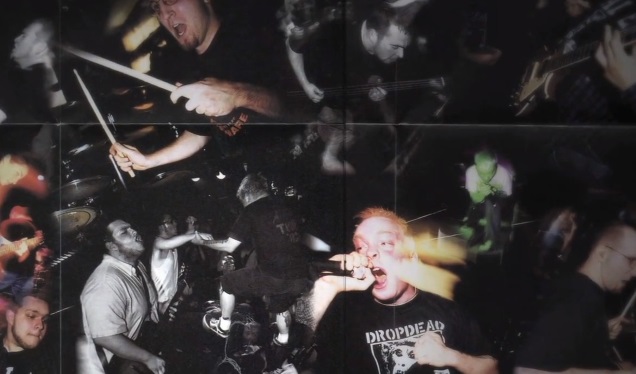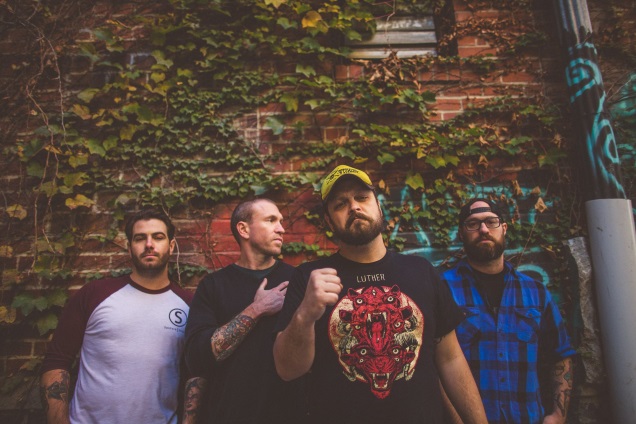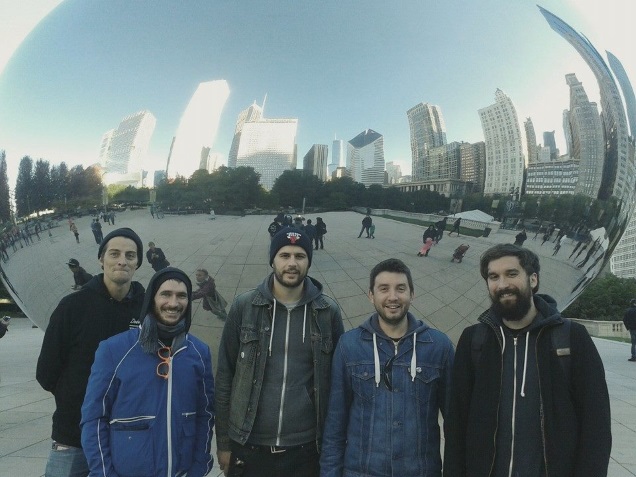Seating for the screening is very limited – get your advance tickets here. MorseCode Recordings will be releasing the DVD which includes the feature length documentary, a multi camera show from The Knitting Factory in Brooklyn, and deleted scenes. Pre-order here – the DVDwill start shipping on February 27th.
Indecision was a prolific hardcore band which was started in Bay Ridge, Brooklyn in 1993 and officially disbanded in the summer of 2000 though they still play shows occasionally for charity.
Indecision is known for their song “Hallowed be Thy Name”. The song features the lyric “For those I love, I will sacrifice” that fans across the world have turned into a tattoo. Most famously, the image of the tattoo on the ribs of a 19-year-old US Army Infantryman named Kyle Hockenberry being treated in a medevac helicopter following an explosion that cost him both of his legs and one arm. The photo was taken for a military newspaper and went on to win photographer Laura Rauch an award from the Society of Professional Journalists. The lyric’s popularity with members of the armed forces surprised some of the band’s fans; the full line being, “for those I love I will sacrifice, not for those I’ve never seen.”Formed in 1993 in Brooklyn, NY, disbanded summer 2000 in El Paso, TX. Notorious for their tireless work ethic, Indecision toured the world until exhaustion, literally. They released three full length albums, as well as countless 7″s and EPs. Took pages from Sick Of It All, Agnostic Front and the Cro-Mags as well as the West coast sounds of Unbroken, Undertow and Outspoken and created a sound of their own. Indecision is revered for their uncompromising integrity. Inspired some, hated by many but ultimately respected by all.
The band members—guitarist Justin Brannan drummer Pat Flynn, bassist Steve Bago and vocalist Tom Sheehan (who was replaced by Artie Phillie in 1998) — met while attending Xaverian High School in the Bay Ridge section of Brooklyn. The band added second guitarist Rachel Rosen after having met her while performing live on her infamous WNYU radio show, Crucial Chaos, in 1996.
Initially Indecision played mostly in local clubs. Over time, a lot of the venues in their neighborhood closed down, which prompted them to take a larger step and lead to the bands integration into the New York City hardcore scene. In the early days, the band would often show up to gigs all in one car, with their equipment tied to the roof with Bungee cords.Relentless recording and touring kept the band relevant long after many of their contemporaries faded away. Inspired by bands like Black Flag, Indecision embarked on voracious trailblazing tours, and it became their trademark usually spending a solid 9 to 10 months a year on the road. They were dubbed “The Working Man’s Band” for their affinity to tour cities and countries that other bands wouldn’t dare.
Indecision was the first American band to play in Croatia (Zagreb) after the Croatian War of Independence ended in 1995
Records and labels
The band released their first recording in 1993 on a 7-inch released by R.P.P., a then small Belgian hardcore label. Over the next 7 years, Indecision would tally over a dozen 7-inch singles on a number of different labels, including many limited color vinyl and special edition covers. The band got known on a very grassroots word-of-mouth level from New York City to Thailand, where Indecision remains one of the most popular underground American bands to this day.
In 1996 they signed with WreckAge/Exit Records family and would release 3 albums with the label over the next 3 years: “Unorthodox”, “Most Precious Blood” and “To Live and Die in New York City”, all of which showed off their slightly metal-tinged brand of thought-provoking hardcore (which managed to express anger and injustice without being hateful).To Live and Die in New York City
In 1998, “To Live and Die in New York City” was their first album to feature the polarizing Artie Phillie on vocals (whom the band befriended and poached from noise-crust-punk labelmates, Milhouse), but the album retained the straight-ahead style that their other releases possessed.
The album featured an eerily prophetic manipulated photo of the Manhattan skyline, including the World Trade Center, completely engulfed in flames. Post-September 11 the album cover was banned in many places.The song “Purgatory” features an audio sample about the Union Carbide tragedy in Bhopal, India. In December 1984, a gas leak at a Union Carbide India Limited plant in Bhopal, India, results in tragic loss of life in what is known as the Bhopal disaster, when up to 20,000 people lost their lives.[10]
Release the Cure
In 1999 they tried their luck at another label, putting out Release the Cure on M.I.A. Records (and on Overcome Records in Europe). This, arguably their most highly acclaimed album, would be their last.
The lyrical content was notably more socio-political with songs questioning the government and health care and conspiracy theories in regard to AIDS and cancer research. It was the first album recorded with full songs with singer Artie…formerly of the band Milhouse. Tom Sheehan was singer previous and now for Most Precious Blood















